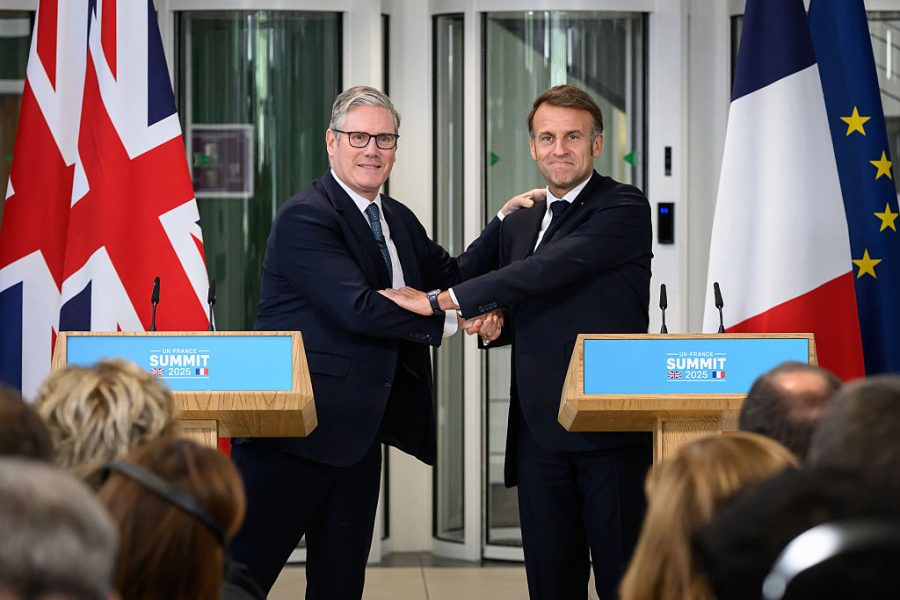Britain’s ‘one in one out’ migrant deal with France takes effect today, and Prime Minister Keir Starmer issued a stark warning to anyone considering making the journey across the Channel. ‘We send a clear message – if you come here illegally on a small boat you will face being sent back to France.’
The ‘one in, one out’ treaty with France hardly takes back control of Britain’s borders
In a manner of speaking. The terms of the treaty state that Britain will lodge a request with France for returning a migrant within 14 days of their arrival in Britain. The French will then study the request and, if they agree to accept the individual, they will organise their return. The process for each migrant is expected to take up to three months, and it’s envisaged that an average of fifty migrants will be returned each week. France will send a similar number to Britain.
So far this year, 25,436 migrants have crossed the Channel, so when the PM warns that migrants ‘will face being sent back’, what he actually means is ‘may face being sent back in the event you are very unlucky’.
The treaty excludes unaccompanied minors from the scheme, which may lead to a surge in adults claiming to be under 18. It was recently reported that one quarter of illegal immigrants arriving in Britain claimed falsely to be minors. To combat this, the government has promised to introduce AI face checks, but not until next year. People deemed to be ‘medically vulnerable’ are also exempt.
The cost of transporting migrants back to France will be borne by the British taxpayer, another addition to a bill that since 2014 has cost the country around £750 million. In that time France has done little to stem the flow of migrants across the Channel and there is scepticism that this latest deal will have any significant effect. According to Chris Philp, the shadow home secretary, the treaty is ‘completely unworkable and will be ruthlessly exploited by human rights lawyers to prevent people being returned to France’.
What, for example, constitutes being ‘medically vulnerable’? Right to Remain, a human rights NGO, recently published a blog advising migrants about ‘human rights applications that are based on medical cases’. It mentioned a 2016 ruling by the European Court of Human Rights in which it was declared that deporting a sick immigrant would be a breach of article 3 of its convention on human rights. The cynic might wonder if migrants won’t suddenly start developing a nasty dose of the lurgy.
The power of the human rights industry to dictate Europe’s migrant policy was demonstrated last week, to the [8] fury of Italy’s PM Giorgia Meloni. The European Court of Justice (ECJ) ruled in favour of two Bangladeshi migrants, who were rescued in the Mediterranean by an Italian vessel and taken to Albania to be processed, in line with a deal agreed between the two countries. The pair’s asylum claims were rejected based on Italy’s classification of Bangladesh as a ‘safe’ country, but this ruling was overturned by the ECJ. ‘This is a development that should concern everybody,’ said Meloni’s office, adding that the ruling ‘weakens policies to combat mass illegal immigration and defend national borders’.
Britain’s treaty with France is described as a ‘temporary scheme … to test effective and swift procedures’ and it expires on 11 June 2026. One day later, the EU’s Pact on Migration and Asylum comes into effect. Brussels defines the pact as ‘a set of new rules managing migration and establishing a common asylum system’.
The pact has plenty of critics among Europe’s right. Fabrice Leggeri, once the head of Frontex, Europe’s border agency, and now an MEP in Marine Le Pen’s National Rally, is withering in his assessment of the pact. ‘Rather than preventing illegal entries, it organises their redistribution among states, effectively legalising a process that began illegally,’ he said in an interview last month. One of the Pact’s rules is a fine of €20,000 (£17,400) for each migrant that a member state refuses to accept.
Is it just a coincidence that Britain’s treaty with France expires the day before the EU’s migrant pact comes into play? Or is the deal agreed between Starmer and Macron a means of easing Britain into the pact? The Migration Observatory, a think tank based at Oxford University, recently addressed this possibility and stated:
A broader agreement with the EU in the future could potentially offer access to the EU’s biometric asylum database, Eurodac, which stores the fingerprints of asylum seekers and unauthorised entrants. Regaining access to the database had been described as a potential “gamechanger” by Home Office officials.
Keir Starmer is accused by many Brexiteers of wanting to rejoin the EU ‘by the back door’. The ‘one in, one out’ treaty with France – which can be terminated by either side with a month’s notice – hardly takes back control of Britain’s borders. Quite the reverse. It is giving control to the French – and by extension to Brussels.
